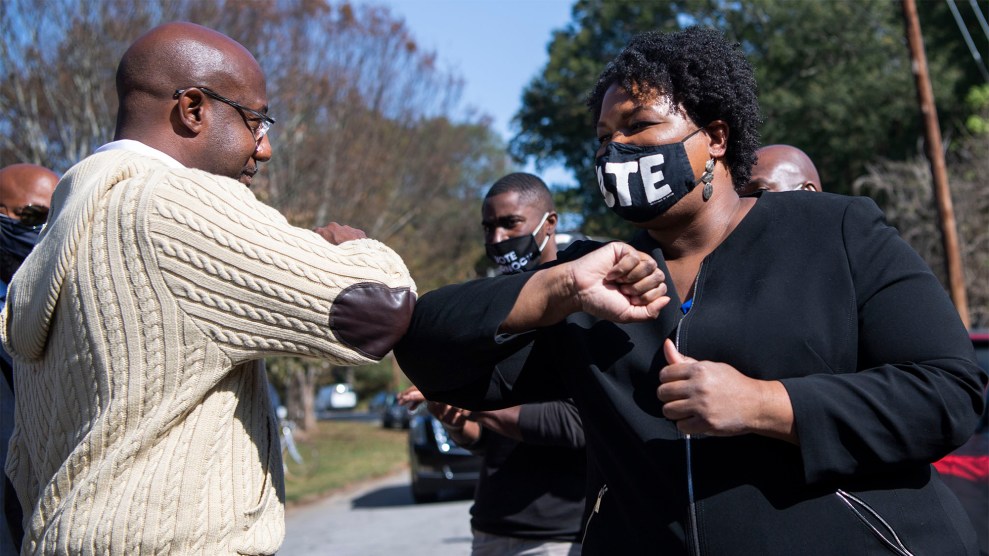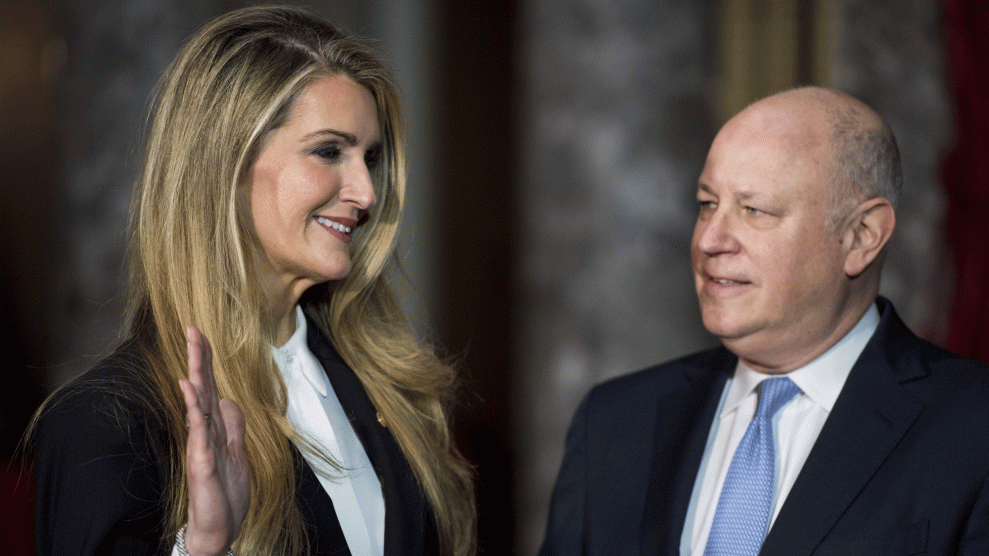
Ben Gray/AP
At a debate on Sunday night, Sen. Kelly Loeffler, the Republican vying in one of the two critical January 5 Senate run-offs in Georgia, declared that she has been using her “private sector experience to make sure that Georgians get back to work.” But one of her private sector experiences was an episode in which her company provided a platform for highly speculative unregulated energy trading that ended up causing an Enron-like scandal and costing residents of Georgia millions of dollars.
Before she was appointed in late 2019 to fill a Senate vacancy, Loeffler, a prominent Republican donor, had spent 16 years working in the corporate management of Intercontinental Exchange, a Fortune 500 company that owns the New York Stock Exchange and other financial markets, as well as other businesses, including digital mortgage services. The CEO of the company, Jeffrey Sprecher, is her husband, and together they are worth $800 million. (Loeffler, who has been dogged by questions about her controversial stock trading, is the wealthiest member of Congress.) When she left Intercontinental—which is known as ICE—in 2018, a press release noted that Loeffler had led “all aspects of ICE’s investor relations, communications, marketing strategy, brand, digital platforms and sustainability efforts, among many other contributions.” She still holds between $5 million and $25 million in ICE stock, according to her most recent financial disclosure.
At one point while Loeffler was helping to run ICE, the firm was involved in a financial controversy that was emblematic of the unrestrained corporate wheeling-and-dealing of the 2000s that led to the economic collapse of 2008. And Georgia homeowners paid a price.
Here’s what happened. In 2006, a giant hedge fund called Amaranth Advisors accumulated massive natural gas holdings on the New York Mercantile Exchange (NYMEX) and was dominating the natural gas market. It held up to 70 percent of natural gas commodities on the exchange and, consequently, was able to manipulate prices by buying or selling large chunks of its holdings. (Amaranth’s energy and commodities trading desk had been set up by a former Enron trader who had gone to work for the hedge fund.) According to a subsequent Senate investigation, Amaranth’s moves “constituted excessive speculation” and “had a direct effect on U.S. natural gas prices and increased price volatility in the natural gas market.”
In August of that year, NYMEX, concerned about Amaranth’s trading, directed the fund to reduce its natural gas positions. Amaranth did so on NYMEX, but it increased its natural gas holdings on an unregulated energy exchange run by ICE—Sprecher and Loeffler’s firm. “NYMEX’s instructions to Amaranth did nothing to reduce Amaranth’s size, but simply caused Amaranth’s trading to move from a regulated market to an unregulated one,” according to the Senate report. And the hedge fund kept on trading its natural gas holdings.
Amaranth was able to resort to this maneuver because of the so-called “Enron loophole” in the Commodity Futures Modernization Act of 2000. This loophole, which had been inserted into the law at the request of Enron (the energy giant that would collapse spectacularly in 2001) and other energy-trading firms, exempted electronic energy exchanges, such as the one owned by ICE, from the oversight and regulation conducted by the Commodity Futures Trading Commission (CFTC). There were no trading limits on ICE’s exchange, and no routine government oversight. The Senate report pointed out that this loophole and the ability of an investor to shift to the market run by ICE impeded regulators’ “authority to detect, prevent, and punish market manipulation and excessive speculation.”
But operating an unregulated exchange was good business for ICE. As CFTC commissioner Bart Chilton noted in 2007, the Enron loophole “helped foster the incredible growth of the Intercontinental Exchange.”
Amaranth’s natural gas skullduggery in 2006 went too far. During a sell-off, the firm ended up losing $6 billion and experienced a stunning crash. The firm had to shut down.
ICE publicly said this debacle wouldn’t hurt its own prospects, maintaining, “Amaranth‘s business is not individually material to ICE’s revenues.” But others incurred a cost. Partly due to Amaranth’s speculative trading on the unregulated ICE exchange, purchasers of natural gas that year were hit with inflated prices. “Many of these inflated costs were passed on to consumers, including residential users who paid higher home heating bills,” the Senate report found.
At a congressional hearing in 2007, the late Rep. John Dingell (D-Mich.) cited the Amaranth case as an example of speculation that caused great harm: “This is not a victimless crime. In the summer of 2006 Amaranth took enormous positions which appear to have inflated the price of natural gas for delivery in the following winter. Businesses, utilities, schools and hospitals as well as individual consumers wound up paying abnormally high rates as a result… As a result, and according to a recent Senate report, speculation of this nature may have added 20 to 25 dollars per barrel to the price of crude in 2006. The Industrial Energy Consumers of America estimates that Amaranth’s speculation alone cost consumers of natural gas as much as $9 billion from April to August of last year.”
The Municipal Gas Authority of Georgia calculated that 243,000 of its customers collectively had to pay an extra $18 million in the winter of 2006 and 2007 because of Amaranth’s shenanigans.
Those machinations were partly made possible by ICE, which profited off Amaranth’s unregulated trading. TheStreet.com reported, “It was the relative lack of oversight at the ICE that let Amaranth make the high-risk natural gas trades that ultimately turned sour, critics charge… [T]he ICE is exempt from reporting trading data for over-the-counter trades to regulators at the Commodities Futures Trading Commission. Critics say the loophole permitted Amaranth to aggressively add to its high-risk bet that natural gas prices would rise at a future date.”
Naturally, ICE had previously opposed efforts to allow the CFTC to regulate its energy exchange—a move that might have prevented the steep rise in natural gas prices and the collapse of Amaranth. Such a reform, ICE stated in an annual report, “could require us and our participants to operate under heightened regulatory burdens and incur additional costs” and “deter some participants from trading on our…platform.” In other words, ICE would lose money if trading on its exchange was monitored to safeguard against the sort of speculation and abuse that occurred in the Amaranth case and that posed an estimated $9 billion cost to American families and consumers.
At the time of the Amaranth flame-out, Loeffler, serving as a spokesperson for the company, defended ICE, saying it was too soon to form any conclusions about the Amaranth implosion. “We think until there is more information, it’s not fair for anyone to guess what Amaranth may have been doing,” she said. “We believe we are only a small piece of the…market and certainly the most transparent piece.”
After the Amaranth disaster, ICE did begin sharing information on traders’ positions with the CFTC. In 2009, after Congress took steps to close the Enron loophole, the CFTC slapped rules on natural gas trading on ICE. “To protect the American public, it is essential that we bring transparency and accountability to the marketplace,” then-CFTC commission chairman Gary Gensler said. Loeffler publicly noted then that ICE expected to impose limits on trading to stop any one investor from gaining too much control of a market.
During the Amaranth episode, ICE was not accused of any wrongdoing. But the firm that has brought Loeffler and her husband into the ranks of near-billionaires did provide a trading venue for a rapacious hedge fund whose misdeeds ended up forcing families in Georgia and elsewhere to pay more to heat their homes.
The Loeffler campaign did not respond to a request for a comment regarding this slice of her private sector experience. ICE, too, did not reply to a request for comment.


















